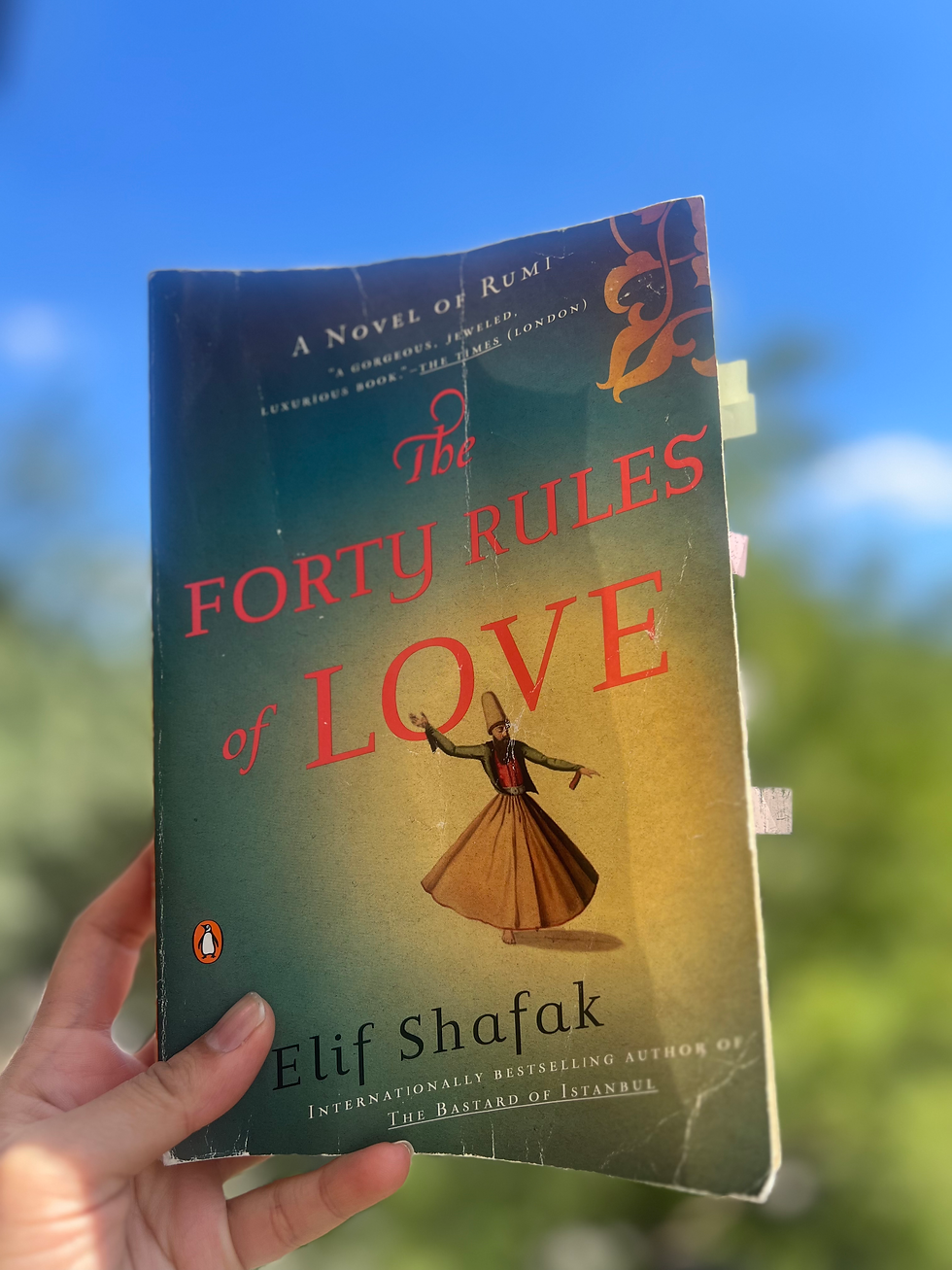The Forty Rules of Love
- Hira

- Oct 3, 2023
- 3 min read

I came across the Forty Rules of Love recommendation by Pakistan's Former Prime Minister Imran Khan in 2020 - Dawn Newspaper (newspaper of Pakistan) . As I mentioned earlier, with the diminishing reading community (especially in Pakistan), I was delighted to see that the head of the state recommends books. I picked up this book thinking it was a chic flick, but I was wrong. I agree now when they say," Never judge the book by its cover," literally, we shouldn't!
The book "Forty Rules of Love" by Elif Shafak caters to a mass audience and is translated into multiple languages. The novel whirls around the central theme of Sufism and Love. It is not a Romeo and Juliet play. Instead, it is about self-identification, Metaphorical Love, known as Ishq -e – Majazi, and Divine Submission, known as Ishq-e-Haqeeqi.
The story revolves around Ella Rubinstein, a dentist's wife and mother of three. On the surface, Ella has a picture-perfect life. However, her marriage is not working. Her life takes a turn when she works as a literary agent and is assigned to read and write a report for a novel, "Sweet Blasphemy." The narrative of her assigned book builds around 13th-century renowned poet and scholar Maulana Jalaludin Rumi and his relationship with the Sufi mystic Shams of Tabraiz. As the protagonist, Ella reads the novel and connects with the author Aziz. A. Zahara.
This novel's strength lies in how the fictitious storyline of Ella Rubinstein is sophisticatedly tied with the facts of Shams Tabaraiz and Maulana Rumi's (Ustaad and Murshid) life and relationship. Elif Shafak successfully captivated the reader while running both stories parallel. Apart from the chapters dedicated to Ella, the book incorporates a novel within a novel, using the first-person narrative to provide insight into their minds and perspective.
The forty-rules spiritual quotes make this book overall a heartwarming experience. Two of my favorites are:
- "East, West, South or North makes little difference. No matter what your destination, just be sure to make every journey a journey within. If you travel within, you'll travel the whole wide world and beyond."

- "Nothing should stand between yourself and God. Not imams, priests, rabbis, or any other custodians of moral or religious leadership. Not spiritual masters, not even your faith. Believe in your values and your rules, but never lord them over others. If you keep breaking other people's hearts, whatever religious duty you perform is no good. Stay away from all sorts of idolatry, for they will blur your vision. Let God and only God be your guide. Learn the Truth, my friend, but be careful not to make a fetish out of your truths."

An extraordinary thing about this book is that each chapter's first word starts with a "B."
Moreover, this book is categorized into universal elements - earth, water, wind, fire, and the void.
𝗘𝗮𝗿𝘁𝗵 means the things that are solid, absorbed, and still.
𝗪𝗮𝘁𝗲𝗿 means the things that flow and are unpredictable.
𝗪𝗶𝗻𝗱 resembles the things that evolve, shift and challenge.
𝗙𝗶𝗿𝗲 resembles the things that damage, devastate, and destroy
𝗧𝗵𝗲 𝘃𝗼𝗶𝗱 which meant the things which are present through their absence.

Key Takeaways:
- Respect yourself
- Pain is vital for spiritual growth
- If you are unhappy, you cannot make anyone happy
- Impure heart and mind can never be fruitful
I hope my review influences you to read The Forty Rules of Love. Please drop your comments, as I look forward to them.
Comments